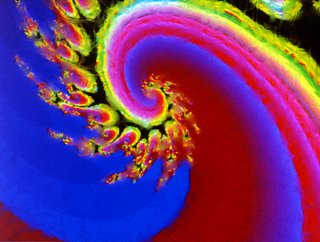The Uncertainty Principle
TAG: essay quantum physics Werner Heisenberg buddhismThis morning when I was surfing on the net I come across to some sites about the uncertainty theory in quantum psychics (In stead of sleeping I was online in the morning and looking for things like quantum theories. I know, don’t tell me!…)
The man behind this theory was Werner Heisenberg (1901 - 1976), one of the greatest physicists of the twentieth century. He is best known as a founder of quantum mechanics, the new physics of the atomic world, and especially for the uncertainty principle in quantum theory. In his words this theory is:
“The more precisely the position is determined, the less precisely the momentum is known in this instant, and vice versa.”
 Roughly speaking, the uncertainty principle states that one cannot assign exact simultaneous values to the position and momentum of a quantum mechanical system. Because of the scientific and philosophical implications of the seemingly harmless sounding uncertainty relations, physicists speak of an uncertainty principle, which is often called more descriptively the “principle of indeterminacy”. This relation has profound implications for such fundamental notions as causality and the determination of the future behavior of an atomic particle. Suppose a particle has momentum p and position x. In a Quantum Mechanical world, we would not be able to measure p and x precisely. There would be an uncertainty associated with each measurement that we could never get rid of, even in a perfect experiment! It’s like this then:
Roughly speaking, the uncertainty principle states that one cannot assign exact simultaneous values to the position and momentum of a quantum mechanical system. Because of the scientific and philosophical implications of the seemingly harmless sounding uncertainty relations, physicists speak of an uncertainty principle, which is often called more descriptively the “principle of indeterminacy”. This relation has profound implications for such fundamental notions as causality and the determination of the future behavior of an atomic particle. Suppose a particle has momentum p and position x. In a Quantum Mechanical world, we would not be able to measure p and x precisely. There would be an uncertainty associated with each measurement that we could never get rid of, even in a perfect experiment! It’s like this then:“You drive too fast Jonathan, slow it down! Where are we now?..”
“I don’t know Jennifer. I drive 100 miles per hour and this is such a high speed to determine our position. But also “high” is relative and...”
“Fuck you Jonathan... I know I should listen my mom and never marry you. Stop somewhere and let's ask to a gasstation!...”
 In quantum physics, the observer is no longer external and neutral, but through the act of measurement he becomes himself a part of observed reality. It also has huge implications on the epistemology of science: certain facts are no longer objectifiable in quantum theory. Does this mean that ultimate truth is unknowable? Many, at least Albert Einstein, felt that quantum theory had somehow "missed the point". He was an outspoken critic of quantum mechanics and is often quoted on his comment regarding the uncertainty principle: "The God doesn't play dice." In a conversation with Heisenberg he said:
In quantum physics, the observer is no longer external and neutral, but through the act of measurement he becomes himself a part of observed reality. It also has huge implications on the epistemology of science: certain facts are no longer objectifiable in quantum theory. Does this mean that ultimate truth is unknowable? Many, at least Albert Einstein, felt that quantum theory had somehow "missed the point". He was an outspoken critic of quantum mechanics and is often quoted on his comment regarding the uncertainty principle: "The God doesn't play dice." In a conversation with Heisenberg he said:Heisenberg: "One cannot observe the electron orbits inside the atom. [...] but since it is reasonable to consider only those quantities in a theory that can be measured, it seemed natural to me to introduce them only as entities, as representatives of electron orbits, so to speak."
Einstein: "But you don't seriously believe that only observable quantities should be considered in a physical theory?"
Heisenberg: "I thought this was the very idea that your relativity theory is based on?" Heisenberg asked in surprise.
Einstein: "Perhaps I used this kind of reasoning," replied Einstein, "but it is nonsense nevertheless. [...] In reality the opposite is true: only the theory decides what can be observed."
 Anyway, I am not a physician but what I understand from this theory is that “you can’t observe anything in reality in a way that they are, but you DO also change anything you observe”. Hmm, if it’s applied to the universe and to the “universal, ultimate knowledge”, this is a kind of principle which proves that universe is getting more and more complex as long as we discover. So, we can't never really know “the reality” (I guess “you can’t have your cake and eat it too”). Actually, then, “you are what you believe”. And again, maybe;
Anyway, I am not a physician but what I understand from this theory is that “you can’t observe anything in reality in a way that they are, but you DO also change anything you observe”. Hmm, if it’s applied to the universe and to the “universal, ultimate knowledge”, this is a kind of principle which proves that universe is getting more and more complex as long as we discover. So, we can't never really know “the reality” (I guess “you can’t have your cake and eat it too”). Actually, then, “you are what you believe”. And again, maybe;THERE IS NO REALITY.
EMPTINESS IS ALWAYS THERE.
(image is from Heart Sutra; "Form is Emptiness")
In some Buddhist teachings they have this, the teachings on emptiness (Sanskrit sunyata or shunyata); all things are totally empty of any defining essence. Consequently all things have no fixed identity ('inherent existence') and are in a state of impermanence - change and flux - constantly becoming and decaying. Not only are all things constantly changing, but if we analyze any phenomenon in enough detail we come to the conclusion that it is ultimately unfindable, and exists purely by definitions in terms of other things - and one of those other things is always the mind which generates those definitions. So, "Nothing" is certain in life.
"What were you searching for all your life long?"
"The Truth.."
"What did you find?"
"Nothing!"
Starting from The Uncertainty Principle and jumping to the emptiness early in the morning, that was the morning blog then...
1 Noises:
THANK YOU for this post...quite synchronous actually...
As I left the house this morning I was thinking about the truth and all of reality being emptiness and nothingness, and at work had a long discussion on a very similar topic...so this post ties in beautifully!!
I am familiar with Heisenberg's Uncertainty Principle, but it is quite nice to see it related to Buddhist teachings!!!!!
Cheers!
Post a Comment
<< Home